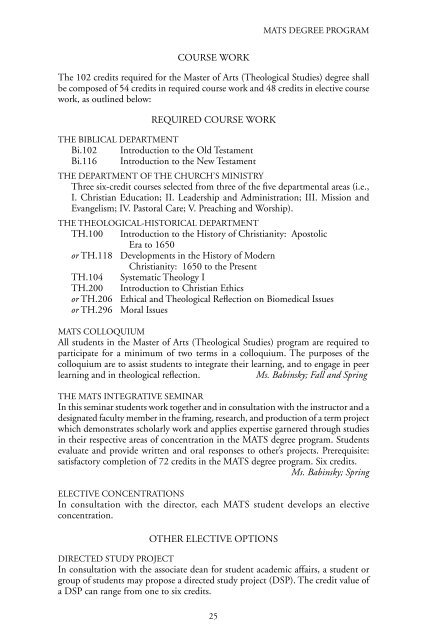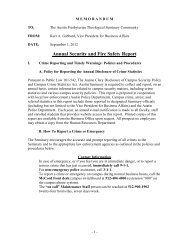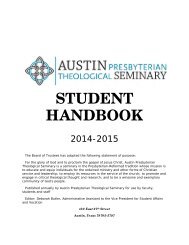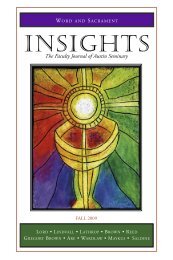Catalogue 2008 Book - Austin Presbyterian Theological Seminary
Catalogue 2008 Book - Austin Presbyterian Theological Seminary
Catalogue 2008 Book - Austin Presbyterian Theological Seminary
Create successful ePaper yourself
Turn your PDF publications into a flip-book with our unique Google optimized e-Paper software.
COURSE WORK<br />
The 102 credits required for the Master of Arts (<strong>Theological</strong> Studies) degree shall<br />
be composed of 54 credits in required course work and 48 credits in elective course<br />
work, as outlined below:<br />
REQUIRED COURSE WORK<br />
THE BIBLICAL DEPARTMENT<br />
Bi.102 Introduction to the Old Testament<br />
Bi.116 Introduction to the New Testament<br />
THE DEPARTMENT OF THE CHURCH’S MINISTRY<br />
Three six-credit courses selected from three of the fi ve departmental areas (i.e.,<br />
I. Christian Education; II. Leadership and Administration; III. Mission and<br />
Evangelism; IV. Pastoral Care; V. Preaching and Worship).<br />
THE THEOLOGICAL-HISTORICAL DEPARTMENT<br />
TH.100 Introduction to the History of Christianity: Apostolic<br />
Era to 1650<br />
or TH.118 Developments in the History of Modern<br />
Christianity: 1650 to the Present<br />
TH.104 Systematic Theology I<br />
TH.200 Introduction to Christian Ethics<br />
or TH.206 Ethical and <strong>Theological</strong> Refl ection on Biomedical Issues<br />
or TH.296 Moral Issues<br />
MATS COLLOQUIUM<br />
All students in the Master of Arts (<strong>Theological</strong> Studies) program are required to<br />
participate for a minimum of two terms in a colloquium. The purposes of the<br />
colloquium are to assist students to integrate their learning, and to engage in peer<br />
learning and in theological refl ection. Ms. Babinsky; Fall and Spring<br />
THE MATS INTEGRATIVE SEMINAR<br />
In this seminar students work together and in consultation with the instructor and a<br />
designated faculty member in the framing, research, and production of a term project<br />
which demonstrates scholarly work and applies expertise garnered through studies<br />
in their respective areas of concentration in the MATS degree program. Students<br />
evaluate and provide written and oral responses to other’s projects. Prerequisite:<br />
satisfactory completion of 72 credits in the MATS degree program. Six credits.<br />
Ms. Babinsky; Spring<br />
ELECTIVE CONCENTRATIONS<br />
In consultation with the director, each MATS student develops an elective<br />
concentration.<br />
OTHER ELECTIVE OPTIONS<br />
DIRECTED STUDY PROJECT<br />
In consultation with the associate dean for student academic affairs, a student or<br />
group of students may propose a directed study project (DSP). The credit value of<br />
a DSP can range from one to six credits.<br />
25<br />
MATS DEGREE PROGRAM










